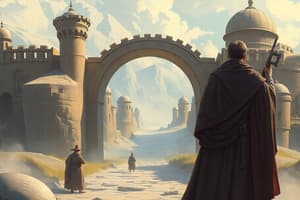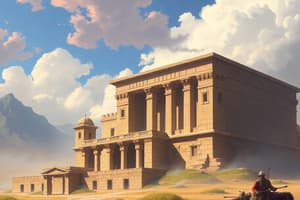Podcast
Questions and Answers
What was Mahatma Gandhi's primary strategy in the Indian independence movement?
What was Mahatma Gandhi's primary strategy in the Indian independence movement?
Nonviolent resistance.
Define historiography and its importance in historical study.
Define historiography and its importance in historical study.
Historiography is the study of historical writing and methods, and it helps us understand how interpretations of history evolve over time.
What is the focus of archaeology in historical research?
What is the focus of archaeology in historical research?
The study of human history through excavation and analysis of artifacts.
How does oral history contribute to our understanding of the past?
How does oral history contribute to our understanding of the past?
What key themes are analyzed in the study of War and Conflict?
What key themes are analyzed in the study of War and Conflict?
What are some benefits of studying history?
What are some benefits of studying history?
What is the significance of chronology in the study of history?
What is the significance of chronology in the study of history?
Differentiate between primary and secondary historical sources with examples.
Differentiate between primary and secondary historical sources with examples.
How can historical interpretation vary among historians?
How can historical interpretation vary among historians?
What marked the beginning of Ancient History?
What marked the beginning of Ancient History?
Identify key characteristics of the Renaissance period.
Identify key characteristics of the Renaissance period.
What was a major development during the Middle Ages?
What was a major development during the Middle Ages?
Which empires are associated with Classical Antiquity?
Which empires are associated with Classical Antiquity?
How did Genghis Khan impact world history?
How did Genghis Khan impact world history?
Flashcards are hidden until you start studying
Study Notes
Overview of History
- History is the study of past events, particularly in human affairs.
- It encompasses a wide range of themes, including politics, culture, society, economics, and technology.
Key Concepts
-
Chronology
- The arrangement of events in the order they occurred.
- Essential for understanding cause and effect relationships in history.
-
Historical Sources
- Primary Sources: Original documents, artifacts, or firsthand accounts (e.g., letters, photographs).
- Secondary Sources: Interpretations or analyses of primary sources (e.g., textbooks, articles).
-
Historical Interpretation
- The process of analyzing and making sense of historical events.
- Different perspectives can lead to varying interpretations of the same event.
Major Eras in History
-
Prehistory
- Time before written records.
- Includes the Stone Age, Bronze Age, and Iron Age.
-
Ancient History
- Begins with the invention of writing (~3500 BCE).
- Key civilizations: Mesopotamia, Ancient Egypt, Indus Valley, Ancient China, and Mesoamerica.
-
Classical Antiquity
- Characterized by the rise of empires (e.g., Roman, Persian).
- Development of philosophy, art, and science.
-
Middle Ages
- Spanning roughly from the 5th to the 15th century.
- Notable for feudalism, the rise of Christianity, and the Islamic Golden Age.
-
Renaissance
- A cultural rebirth from the 14th to the 17th century.
- Emphasis on humanism, art, and science.
-
Modern History
- From the 17th century to the present.
- Key events: Industrial Revolution, World Wars, Cold War, and globalization.
Important Historical Figures
- Alexander the Great: Expanded Greek civilization across the known world.
- Julius Caesar: Played a critical role in the demise of the Roman Republic and the rise of the Empire.
- Genghis Khan: Founder of the Mongol Empire, known for his military prowess and conquests.
- Mahatma Gandhi: Leader of the Indian independence movement against British rule using nonviolent resistance.
Methodologies in Historical Study
- Historiography: The study of historical writing and methods.
- Archaeology: The study of human history through excavation and analysis of artifacts.
- Oral History: Collecting and studying historical information through interviews and testimonies.
Themes in History
- War and Conflict: Analysis of causes, consequences, and impacts on society.
- Social Change: How movements (e.g., civil rights) affect societal structures.
- Economic Systems: Examination of trade, industry, and the evolution of economies over time.
- Cultural Development: The evolution of art, religion, and philosophy throughout history.
Importance of Studying History
- Provides perspective on current events and social structures.
- Helps understand the origins of cultural identities and conflicts.
- Enhances critical thinking and analytical skills.
Overview of History
- History is the examination of past events, especially related to humanity.
- It includes various themes: politics, culture, society, economics, and technology.
Key Concepts
-
Chronology
- Events are arranged in chronological order, crucial for understanding their cause and effect.
-
Historical Sources
- Primary Sources: Original documents and artifacts (e.g., letters, photographs).
- Secondary Sources: Analyses or interpretations of primary data (e.g., textbooks, academic articles).
-
Historical Interpretation
- The evaluation and understanding of historical events, acknowledging that perspectives can lead to differing interpretations.
Major Eras in History
-
Prehistory
- Period before written records, including the Stone Age, Bronze Age, and Iron Age.
-
Ancient History
- Commences with the advent of writing around 3500 BCE; significant civilizations include Mesopotamia, Ancient Egypt, the Indus Valley, Ancient China, and Mesoamerica.
-
Classical Antiquity
- Marked by the emergence of empires such as the Roman and Persian; noted for advancements in philosophy, art, and science.
-
Middle Ages
- Lasting approximately from the 5th to the 15th century; characterized by feudalism, the rise of Christianity, and the Islamic Golden Age.
-
Renaissance
- A cultural revival from the 14th to the 17th century focused on humanism, art, and scientific inquiry.
-
Modern History
- Spanning from the 17th century to the present; includes major events like the Industrial Revolution, World Wars, the Cold War, and the process of globalization.
Important Historical Figures
- Alexander the Great: Known for spreading Greek culture globally through extensive conquests.
- Julius Caesar: Central to the transition from the Roman Republic to the Roman Empire.
- Genghis Khan: Founder of the Mongol Empire, recognized for significant military achievements and conquests.
- Mahatma Gandhi: Prominent leader in India's fight for independence from British rule through nonviolent methods.
Methodologies in Historical Study
- Historiography: Involves the study of historical writing and the diverse methods used in historical research.
- Archaeology: Investigates human history by excavating and analyzing physical remains and artifacts.
- Oral History: Gathers and examines historical information through interviews and personal accounts.
Themes in History
- War and Conflict: Investigates the reasons, effects, and social impacts of wars.
- Social Change: Studies the influence of social movements (e.g., civil rights) on societal evolution.
- Economic Systems: Analyzes trade, industry, and the development of economies throughout history.
- Cultural Development: Focuses on the progression of art, religion, and philosophy over time.
Importance of Studying History
- Offers insights into current events and societal dynamics.
- Aids in understanding the roots of cultural identities and conflicts.
- Improves critical thinking and analytical capabilities.
Studying That Suits You
Use AI to generate personalized quizzes and flashcards to suit your learning preferences.




